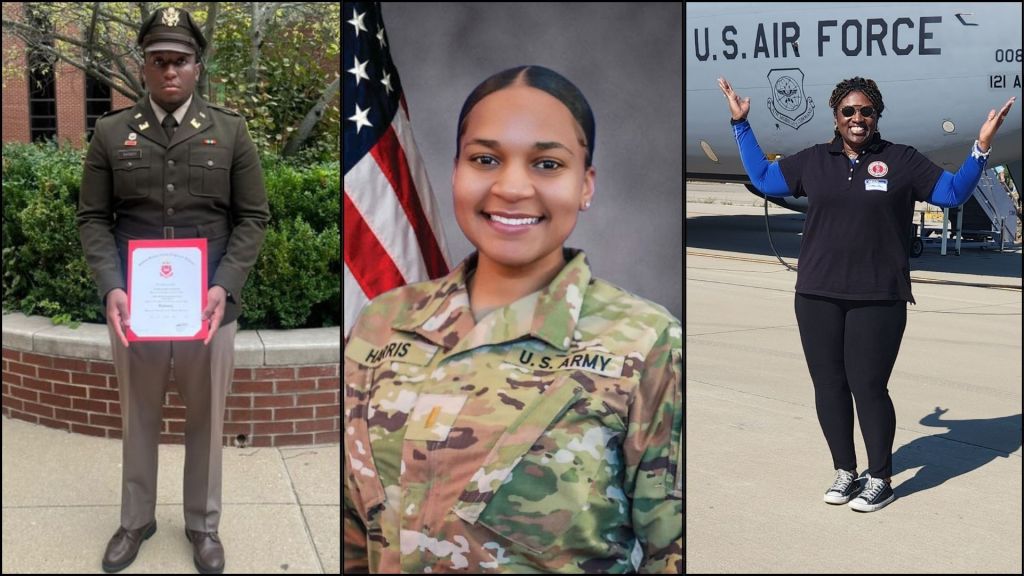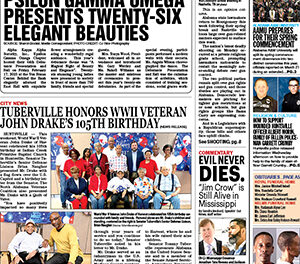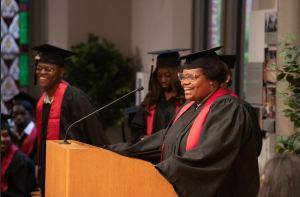By Aria Brent
AFRO Staff Writer
abrent@afro.com
Black Greek Letter Organizations (BGLOs) have played a significant role in shaping the lives and careers of Black service members. With a focus on leadership, community service and academic excellence, many find that time in their respective organizations only heightens their ability to lead in the military.

Naomi Harris, a member of Alpha Kappa Alpha Sorority, often uses her military skills to be a better leader within her organization.
CREDIT: Photo Courtesy of Naomi Harris
Jovanda Curry is a U.S. Army veteran and a member of Zeta Phi Beta Sorority.
CREDIT: Photo Courtesy of Jovanda Curry
BGLOs, or the “Divine Nine,” as they are often called, include Alpha Phi Alpha Fraternity; Alpha Kappa Alpha Sorority; Kappa Alpha Psi Fraternity; Omega Psi Phi Fraternity; Delta Sigma Theta Sorority; Phi Beta Sigma Fraternity; Zeta Phi Beta Sorority; Sigma Gamma Rho Sorority and Iota Phi Theta Fraternity.
The organizations were founded during the early 20th century to promote camaraderie, education and professional advancement for Black people in an era of intense segregation. And while some issues addressed by the BGLOs have changed, the responsibility to advocate and serve still seem to be the driving force that fuels these organizations– even in their service to the Armed Forces.
“I had several mentors that were a part of the military and they were also members of Omega Psi Phi,”said Benjamin Barner, a member of Omega Psi Phi Fraternity. “They talked to me about the benefits that came with ROTC and helping out the community. The same people that encouraged me to join the military are the same people that encouraged me to pledge.”
Barner served in the Reserve Officer Training Corps (ROTC) program at Jackson State University from 2019 to 2023 while earning his undergraduate degree. Following his graduation in 2023 from the historically Black institution, he joined the U.S. Army, where he currently serves as a second lieutenant.
His military service goes hand in hand with the community service he completes as an Omega man.
“Doing community service events with my organization puts a smile on my face and it warms my heart,” Barner said.
Other veterans who spoke with the AFRO noted that serving in their respective organizations and the U.S. military provided them with a sense of fulfillment and pride.
“Service is a big part of who I am and I saw that the Zetas were doing that. I wanted to be a part of what they were doing,” said Angelina Vega, a Coast Guard veteran and a member of Zeta Phi Beta Sorority. “Service has always been a part of my life. A lot of my family served in the Air Force. I was always taught that it’s something that you do. You help your country– it’s your duty.”
From the March on Washington to the 1995 Million Man March and this year’s presidential election– members of BGLOs are constantly leading and serving the Black community and our nation in more ways than one.
These organizations and their members have constantly stood at the forefront of social justice, while many also stood on the frontlines of our nation’s Armed Forces.
While many joined the Divine Nine before their time in the Armed Forces, others were inspired to join a BGLO after their military service came to a close.
“Being in the military definitely provided me the opportunity to meet so many people and to gain so much knowledge,” said Jovanda Curry, a U.S. Army veteran and member of Zeta Phi Beta Sorority. “The network I gained with the military definitely carried over to me wanting to join a sorority when I got out of the military in 2004. I don’t come from a big family and I’ve always wanted a network of positive people to be able to collaborate with.”
The leadership of BGLO members has always extended beyond the battlefield. Figures like Brigadier General Hazel Johnson-Brown, a member of Delta Sigma Theta Sorority, broke barriers as the first Black woman to become a general in the U.S. Army and the first Black chief of the Army Nurse Corps. Similarly, well-known Omega Psi Phi Fraternity member and Marine Corps General, Frank E. Petersen Jr. became the first Black aviator and general in Marine Corps history.
Still today, fraternity and sorority members across the globe uphold the legacy of Divine Nine members who served in the Armed Forces of yesterday.
“Serving in both the military and Alpha Kappa Alpha (AKA) has shaped me into a stronger leader and instilled a profound sense of purpose and community,” said Naomi Harris, a human resource officer in the U.S. Army Reserve. “The military taught me discipline and resilience, which I bring to AKA and every aspect of my life. In turn, AKA has deepened my commitment to service, sisterliness and personal growth–enriching my ability to impact others positively.”
The post Service members speak on life in the military and the Divine Nine appeared first on AFRO American Newspapers.











